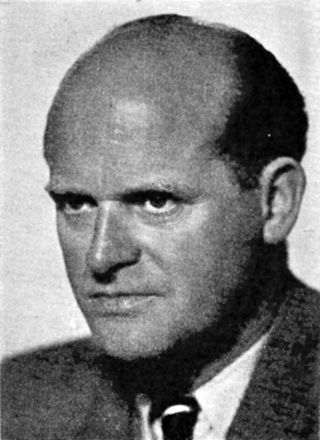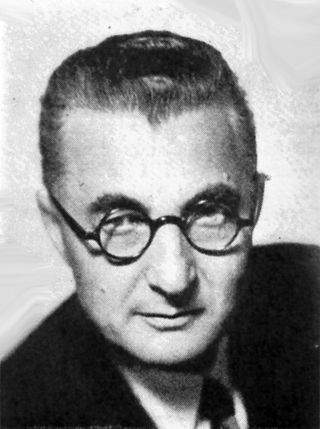Forward is a relative direction, the opposite of backward.

Karl Hjalmar Branting was a Swedish politician who was the leader of the Swedish Social Democratic Party (SAP) from 1907 until his death in 1925, and three times Prime Minister of Sweden. When Branting came to power in 1920, he was the first Social Democratic Prime Minister of Sweden. When taking office for a second term after the general election of 1921, he became the first democratic socialist head of government in Western Europe elected under universal suffrage. An early supporter of modern social democracy and democratic socialism, he led the SAP through a transformation from a radical socialist movement to Sweden's dominant party; the Social Democrats have been Sweden's largest party in every election since 1914, and formed government for 44 continuous years from 1932 to 1976.

The Communist Party of Sweden is a Marxist–Leninist communist party in Sweden and continuation of Workers' Party – The Communists.

Nils Svante Flyg was a Swedish Communist politician who turned pro-Nazi during World War II.

Carl Zeth "Zäta" Konstantin Höglund was a leading Swedish communist politician, anti-militarist, author, journalist and mayor (finansborgarråd) of Stockholm (1940–1950).

Ture Nerman was a Swedish socialist. As a journalist and author, he was a well-known political activist in his time. He also wrote poems and songs.
Young Communist League of Sweden was a political youth organization in Sweden.

Anna Maria Katarina "Kata" Dalström, née Carlberg, was a Swedish socialist and writer. She belonged to the leading socialist agitators and leftist writers in contemporary Sweden, and has been referred to as "the mother of the Swedish socialist working class movement".

Karl Kilbom was a Swedish politician and one of the founders of the Communist Party of Sweden.

Carl Winberg, was a Swedish communist politician and newspaper editor.

Arbetar-Tidningen was a communist newspaper from Gothenburg, Sweden, published between 1929 and 1974.

Norrländska Socialdemokraten (NSD) is a daily regional newspaper published in Norrbotten County, Sweden.
Eteenpäin was a Finnish-language daily newspaper launched in New York City in 1921. The paper was the East Coast organ of Finnish-American members of the Communist Party USA. The paper moved to Worcester, Massachusetts in 1922 and to Yonkers, New York in 1931. In 1950 Eteenpäin was merged with the Communist Party's Midwestern Finnish-language daily, Työmies to create Työmies-Eteenpäin, which continued to be published from Superior, Wisconsin into the 1990s.

For a number of decades after its establishment in August 1901, the Socialist Party of America produced or inspired a vast array of newspapers and magazines in an array different languages. This list of the Non-English press of the Socialist Party of America provides basic information on each title, along with links to pages dealing with specific publications in greater depth.

The Swedish National Socialist Party was a Nazi political party in Sweden. Birger Furugård served as riksledare of the party.
Carsten Walfrid Thunborg was a Swedish politician.

Lars Gunnar Öhman was a Swedish politician, belonging to the Communist Party of Sweden.

The Left Party is a socialist political party in Sweden. On economic issues, the party opposes privatizations and advocates increased public expenditure. In foreign policy, the party is Eurosceptic, being critical of the European Union, and opposing NATO and Swedish entry into the eurozone. It attempted to get Sweden to join the Non-Aligned Movement in 1980, but did not succeed. The party is eco-socialist, and also supports anti-racism, feminism, and republicanism. It stands on the left-wing of the political spectrum.















